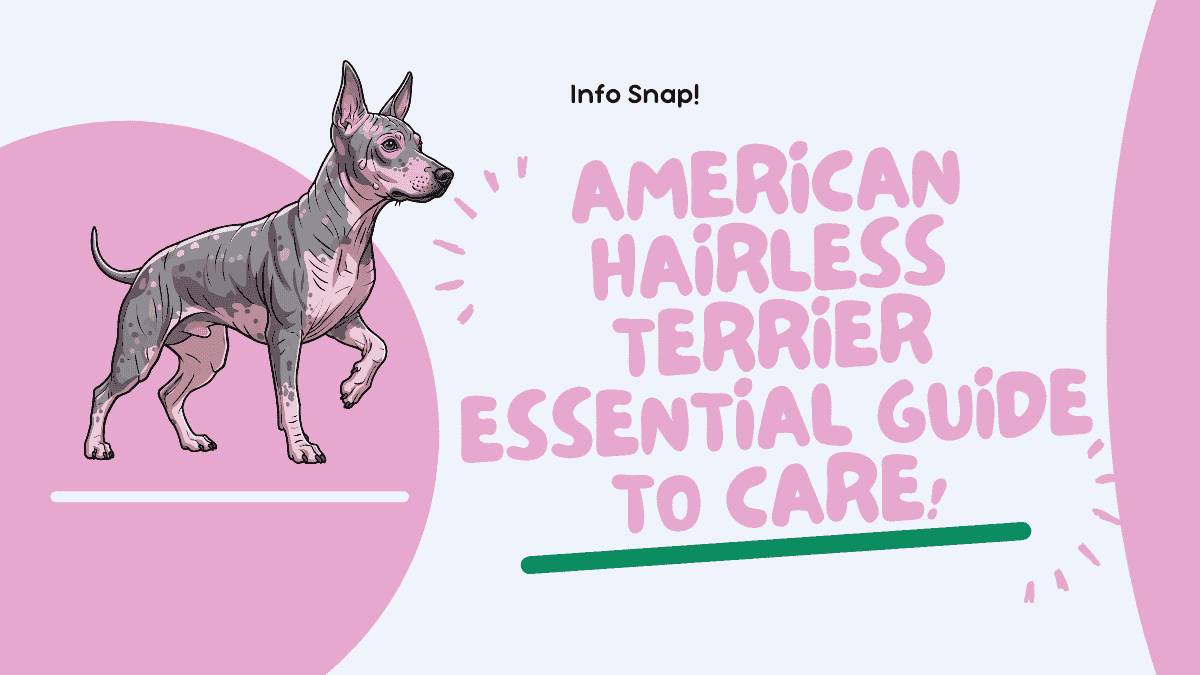Table of Contents
Meet the American Hairless Terrier: A Distinctive Breed
The American Hairless Terrier (AHT), the only hairless dog breed native to the United States, emerged in the 1970s from a hairless Rat Terrier puppy named Josephine in Louisiana. Recognized by the American Kennel Club (AKC) in 2016, AHTs stand 12–16 inches tall, weigh 12–28 pounds, and are available in hairless and coated varieties. The hairless variety sheds its soft birth coat by 8–10 weeks, revealing smooth skin with possible eyebrows and whiskers, while the coated variety has a short, dense coat. Renowned for their intelligence, playfulness, and energy, AHTs are excellent for active households and may be suitable for some allergy sufferers due to minimal shedding, though no dog is fully hypoallergenic.
Caring for Your American Hairless Terrier
American Hairless Terriers are lively, intelligent dogs with a pronounced prey drive, requiring 30–45 minutes of daily exercise through activities like walks, fetch, or agility training. Their compact size makes them adaptable to apartments, provided they receive sufficient mental and physical stimulation. Early socialization and positive-reinforcement training are crucial to manage their terrier temperament and barking tendencies. They thrive with active owners but require supervision around small children or pets due to their hunting instincts.
Exercise and Socialization
Offer 30–45 minutes of daily exercise via walks, play sessions, or dog sports like agility or rally. Puzzle toys and training classes ($50–$150) engage their sharp minds. Socialize puppies before six months to foster confidence and reduce wariness around strangers or other animals.
Health Considerations for American Hairless Terriers
With a lifespan of 14–16 years, AHTs are generally healthy but susceptible to certain conditions. Reputable breeders screen for genetic issues like patella luxation and primary lens luxation (PLL). Annual veterinary check-ups ($300–$500) ensure early detection, and pet insurance ($25–$60/month) can offset costs.
Patella Luxation
Common in small breeds, patella luxation involves the kneecap slipping out of place, causing limping or discomfort. Mild cases are managed with weight control or anti-inflammatories, while severe cases may require surgery ($1,000–$3,000). Screening reduces risk.
Primary Lens Luxation (PLL)
PLL causes the eye’s lens to dislocate, potentially leading to vision loss. Genetic testing identifies carriers, and surgery ($1,500–$4,000 per eye) may be needed. Annual monitoring costs $200–$400.
Hip Dysplasia
Rare in AHTs, hip dysplasia affects joint alignment, causing pain or lameness. Management includes medication or weight control, with surgery ($1,500–$4,000 per hip) for severe cases. Breeder screening minimizes incidence.
Skin Issues
Hairless AHTs are prone to sunburn, acne, or dryness. Dog-safe sunscreen ($10–$20) and protective clothing prevent burns, while weekly bathing with gentle shampoo ($8–$15) and moisturizers ($10–$20) manage skin health. Acne treatments cost $50–$200 annually.
Allergies
Skin allergies may cause itching or redness. Veterinary testing identifies triggers, with treatments like hypoallergenic shampoos ($8–$15), antihistamines, or prescription diets ($40–$70/month) costing $100–$300 annually.
Feeding Your American Hairless Terrier
AHTs require high-protein, AAFCO-compliant dog food suited for small, active breeds (e.g., Hill’s Science Diet, Royal Canin). Puppies need 1–2 cups daily across four meals until 4 months, then three meals until 1 year, transitioning to 1–2 cups across two meals as adults. Monthly food costs are $30–$60, totaling $360–$720 annually. Puzzle feeders provide mental stimulation.
Portion Control and Costs
Portions depend on age, weight, and activity level. Overfeeding risks obesity, exacerbating joint or skin issues. Treats should not exceed 10% of daily calories. Veterinary guidance ensures tailored diets, especially for allergies.
Nutritional Supplements
AAFCO-compliant diets are complete, but supplements may include:
- Fish oil for skin health, aiding allergy relief.
- Glucosamine for joint support, reducing patella luxation risks.
- Probiotics for digestion, particularly with food allergies.
Veterinary approval is required before adding supplements.
Behavior and Training Tips
AHTs are energetic, affectionate, and intelligent, with a terrier’s spunky attitude and strong prey drive. They bond well with children and other dogs when socialized but may chase small pets. Their alertness makes them effective watchdogs, though training can manage barking.
Temperament and Family Life
AHTs are playful and cuddly, thriving in active homes or apartments with engaged owners. They are not suited for long periods alone due to their social nature. Supervision with young children or small animals is advised due to their energy and instincts.
Training Strategies
Use positive reinforcement with treats or praise in short, engaging sessions to counter their stubborn streak. Obedience classes ($50–$150) and early socialization (before six months) ensure good manners and reduce prey-driven behaviors. A fenced yard or leash prevents chasing.
Grooming Your American Hairless Terrier
Hairless AHTs require regular skin care, while coated varieties need minimal brushing. Neither is fully hypoallergenic due to dander, but both shed minimally. Skin protection is critical for hairless AHTs to prevent sunburn or injury.
Skin and Coat Care
For hairless AHTs, bathe weekly with diluted dog shampoo ($8–$15) and a washcloth, using lightweight moisturizers ($10–$20) to prevent clogged pores. Apply dog-safe sunscreen ($10–$20) for outdoor time exceeding 15 minutes. Coated AHTs need weekly brushing with a soft brush and occasional baths. Annual grooming costs are $50–$150.
Ear and Dental Care
Clean ears weekly with a vet-approved solution ($8–$15) to prevent infections ($50–$200 if treated). Brush teeth daily with dog toothpaste ($5–$10) to maintain oral health, with professional cleanings ($150–$400) as needed.
Breed Cost and Considerations for Buying
Purchasing an AHT from a reputable breeder costs $1,000–$2,500, averaging $1,500–$2,000, with prices varying by region (Northeast: $1,200–$2,500; Southeast: $1,000–$2,000; Midwest: $1,000–$2,000; West: $1,200–$2,500) and coat variety. Adoption through shelters or rescues, like the American Hairless Terrier Association, costs $200–$500, covering vaccinations and spay/neuter. In 2024, the AKC reported low registration numbers (exact figures unavailable), reflecting their rarity. Initial setup costs (crate, bed, toys) are $100–$250, with first-year vaccinations at $80–$150. Annual care, including food, grooming, and vet visits, ranges from $800–$1,500, with lifetime costs of $11,200–$24,000 over 14–16 years. Pet insurance ($25–$60/month) is advisable for emergencies.
Care Tips for Buying
When buying an American Hairless Terrier, consider:
- Choose breeders who screen for patella luxation, PLL, and hip dysplasia to ensure puppy health.
- Ensure you can provide 30–45 minutes of daily exercise and mental stimulation. AHTs suit active owners but may challenge novices due to their stubbornness.
- Apartments are suitable if outdoor access is available, but a fenced yard is ideal to prevent chasing due to their prey drive.
- Budget for skin care ($50–$150/year), allergy treatments ($100–$300/year), and potential surgeries (e.g., PLL, patella luxation). Pet insurance mitigates costs.
- Enroll in obedience classes ($50–$150) and socialize early to manage barking and prey drive, ensuring compatibility with family and pets.
Breed Role and Pet Industry Influence
Date of Analysis: September 4, 2025
Context: Niche Breed Popularity, No Specific Event
The American Hairless Terrier’s rarity, with low AKC registrations in 2024, highlights its appeal among allergy sufferers and urban dwellers. Breeder prices range from $1,000–$2,500 (averaging $1,500–$2,000), with adoption fees ($200–$500) supporting rescues like the American Hairless Terrier Association. Their unique skin care needs drive demand for specialized products, while their agility and trainability support dog sport markets.
Influence: The AHT’s hairless variety fuels the $5 billion pet grooming industry through demand for dog-safe sunscreen, shampoos, and moisturizers ($50–$150/year). Health issues like patella luxation and PLL support veterinary services, with surgeries costing up to $4,000, increasing pet insurance adoption ($25–$60/month). The 2025 pet food market, projected at $60 billion, sees demand for high-protein diets for small breeds. Their roles in agility and rally enhance niche markets for training equipment and events, boosting their presence in urban and allergy-conscious communities.
Answers to Common Questions
Are American Hairless Terriers Good Family Dogs?
Yes, with socialization and training, they are playful and affectionate, ideal for families with older children. Supervision is needed with young children or small pets due to their prey drive.
How Much Does an American Hairless Terrier Cost?
Puppies cost $1,000–$2,500 (average $1,500–$2,000). Adoption costs $200–$500. Annual care is $800–$1,500, with lifetime costs of $11,200–$24,000.
Are American Hairless Terriers Hypoallergenic?
No dog is fully hypoallergenic, but AHTs shed minimally, making them suitable for some allergy sufferers. Test exposure before buying due to dander and saliva allergens.
Do American Hairless Terriers Bark a Lot?
Yes, their alertness leads to barking at strangers or noises. Training and stimulation reduce excessive barking, but they remain vocal watchdogs.
How Are American Hairless Terriers with Other Pets?
With early socialization, they get along with dogs but may chase small animals due to their prey drive. Supervision is recommended.
Moving Forward: Ensuring Your American Hairless Terrier Thrives
American Hairless Terriers bring energy, loyalty, and charm to active households. By prioritizing skin care, regular exercise, consistent training, and proactive health management, you can ensure your AHT thrives. Partner with reputable breeders or rescues, consult your veterinarian, and embrace their playful spirit for a rewarding companionship.

